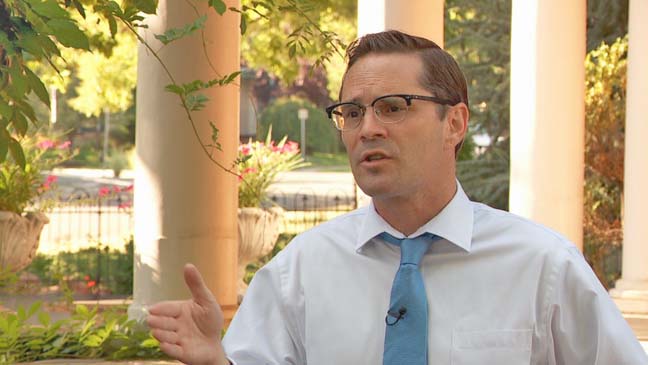
Democratic gubernatorial candidate Chris Peterson of Salt Lake City says he is undeterred by disappointing campaign polling results released by the Hinckley Institution of Politics at the University of Utah.
SALT LAKE CITY – Statewide polling results showing that Democratic gubernatorial candidate Chris Peterson is trailing GOP Lt. Gov. Spencer Cox in popularity come as no surprise to the University of Utah professor.
Peterson acknowledged that his candidacy was going to be a David versus Goliath battle as far back as January.
“I understand … my realistic chances in this race,” Peterson said in a recent interview. “But I just don’t care about that. I’m going to fight for what I believe in.”
A late July survey by the Hinckley Institute of Politics commissioned by the Deseret News found that 49 percent of Utahns would vote for Cox in the race to replace outgoing Gov. Gary Herbert, compared to 17 percent for Peterson and 29 percent of registered voters undecided.
The survey by pollster Scott Rasmussen revealed that 53 percent of registered voters held a favorable opinion of Cox while 24 percent felt the same about Peterson.
In terms of name recognition, 49 percent of survey respondents had no opinion of Peterson compared to 22 with no opinion about Cox.
To the Democratic candidate, those survey results weren’t entirely negative.
“In only four months,” Peterson argued, “we went from low, single-digit name recognition to 51 percent.
“We believe that momentum is on our side. We have polling suggesting our campaign has 27 percent support if the vote were held today.”
For the past month, the gubernatorial campaign has been a no-fireworks affair. In early July, Cox ignored a public challenge from Peterson to take more proactive steps as head of the state’s COVID-19 Task Force. Cox also declined a debate invitation from the Rotary Club and has shown little interest in campaigning at all prior to the Labor Day holiday.
Peterson has meanwhile been active on social media, portraying himself as a reasonable moderate to Utahns who are open to the idea of change.
A comparison of the Rasmussen polling results to state voter registration statistics suggests that Peterson’s appeal might be having an impact.
In the wake of some crossover voting in the GOP primary in June, Democrats make up only 13 percent of registered Utah voters.
The recent survey found that 17 percent of respondents would vote for Peterson and 24 percent held a favorable opinion of the Democratic candidate. If Rasmussen’s pool of survey respondents is truly representative of statewide opinions, that suggests that Peterson’s candidacy is being viewed with favor outside the Democratic Party base.
“Some people think that I don’t understand politics,” Peterson laughs. “Do they think that I got to be the associate dean of a university law school and worked as a consumer advocate in the federal government by being naïve about politics?
“But I am going to do everything I can to secure a better future for Utah. And I think that I’m the best candidate to do that.
“That’s my pitch and I’m not apologizing to anybody for it,” Peterson adds. “Sure, Cox has got more money, more mentoring and all the best political connections. But I’m right.
“So I’m proud to represent my party against the all big boys and I think I have a chance.”
The Rasmussen polling results are based on survey responses from 1,000 registered Utah voters surveyed July 27 to Aug. 1. The poll has a margin of error of plus or minus 3.1 percent.

